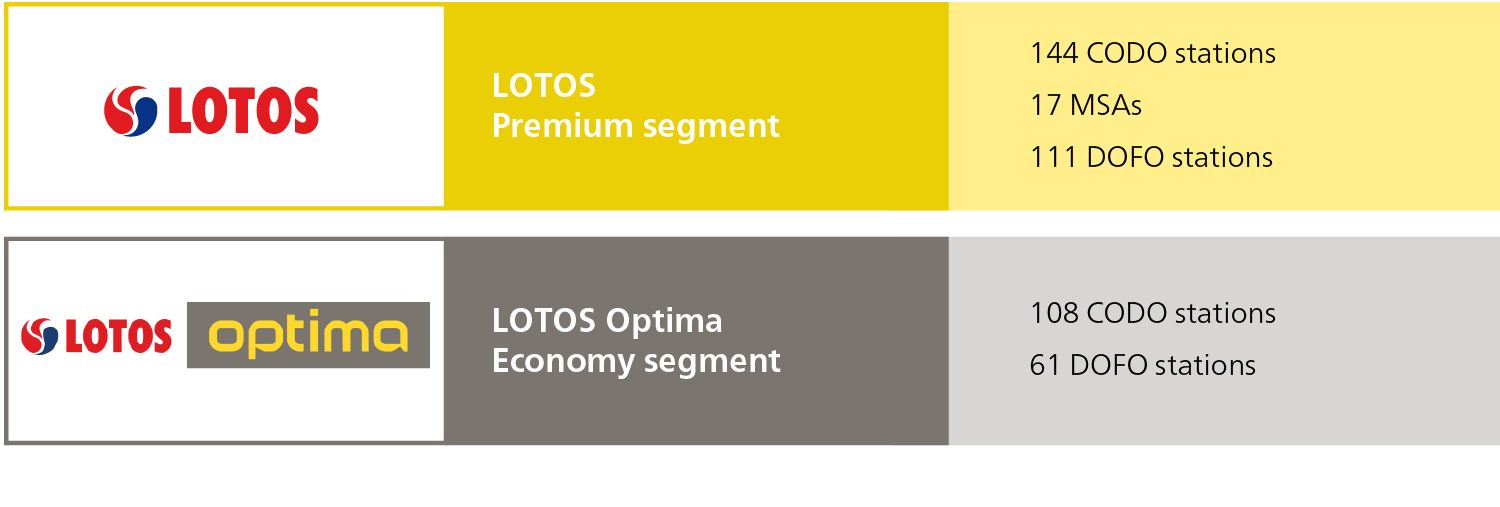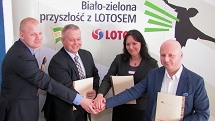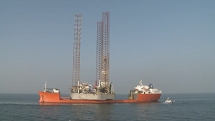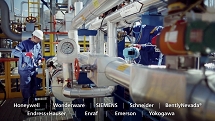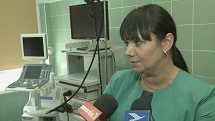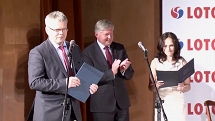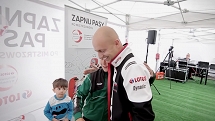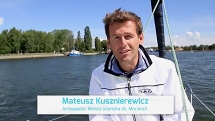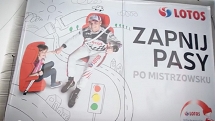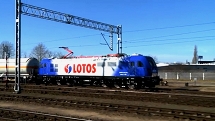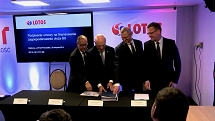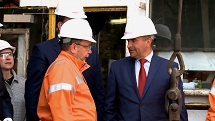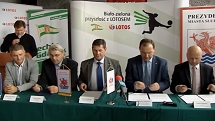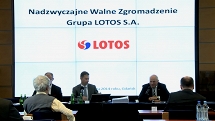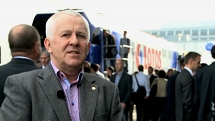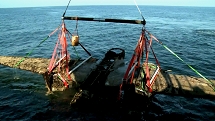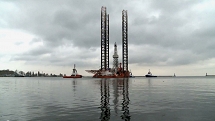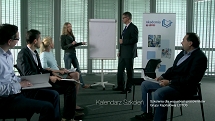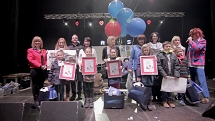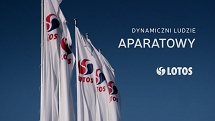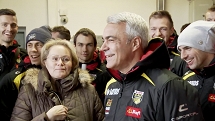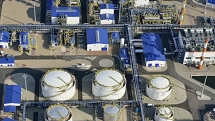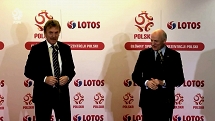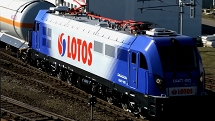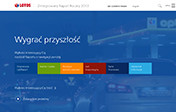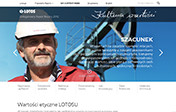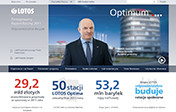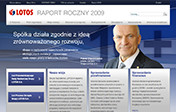-
Financial information
The past year ushered in a series of challenges for the companies in the fuel sector. The decisions made by us have demonstrated that we are able to take rapid steps to adapt to a demanding environment and ensure the desired profitability for our projects.
-
Segment performance
The segmental management model we have implemented enhances management efficiency, delivering cost and revenue synergies across the organization.
-
Letter from the Vice-President of the Board
2014 ushered in a series of challenges for the companies in the fuel sector. The decisions made by the LOTOS Group have demonstrated that we are able to take rapid steps to adapt to a demanding environment and ensure the desired profitability for our projects.
-
Business environment
The key factor that had a strong impact on both the global and Polish petroleum markets in 2014, with significant consequences for the LOTOS Group’s performance, was the price of crude oil, which also determined the price of petroleum products.
-
Strategic objectives
The LOTOS Group’s Strategy is designed to strengthen our position as a strong, innovative and efficient business which plays a major role in ensuring national energy security.
-
Business model
Our operations consist in crude oil production and processing, as well as wholesale and retail sale of petroleum products, among which are: fuels (unleaded gasoline, diesel oil and light fuel oil), heavy fuel oil, bitumens, aviation fuel, naphtha, propane-butane LPG and base oils.
-
Risk and opportunities
At the LOTOS Group, we identify a range of diverse risks, which may affect all areas of our business. The key risks in terms of their impact on our operations are the financial risks as well as risks affecting the exploration and production area. In the analysis of the risks, we also factor in issues related to sustainable development.
-
Key data 2014
With revenue of ca. PLN 28.5bn in 2014, we rank fourth in the group of 500 largest businesses in Poland.

Marketing operations
STATEMENT
2014 was another consecutive year in which our share in the fuel market exceeded the strategic target of 30%. We are a key fuel supplier for all international service station chains operating in Poland.
Maciej Szozda,
Vice-President of the Management Board, Chief Commercial Officer, Grupa LOTOS

We have maintained our position in the B2B channel and consistently expanded our share in the retail market. With a restructured B2B customer portfolio and more efficient and intensified non-fuel sales at our service stations, we were able to deliver higher profit margins, both in wholesale and in retail.
The dynamic expansion of our retail chain brought us closer to reaching the strategic target of a 10% market share in 2015. Last year saw completion of the process of phasing out the patronage (DODO) fuel distribution system, replacing it with a more efficient franchise-based model of cooperation with dealers. At the end of 2014, 441 service stations, including 17 motorway service areas (MSA), operated under LOTOS and LOTOS Optima brands.
In 2014, the LOTOS Group maintained the leading position in sales of technologically advanced bitumens despite prevalent stagnation on the road infrastructure market. Our offering was expanded to include cutting-edge bitumen technologies – paving-grade Warm Mix Asphalts (WMA) and highly-modified bitumens. Testament to the quality of our products is the participation of LOTOS Asfalt in Poland’s most important investment projects involving construction of motorways and airports. As a pioneer of innovation and responsible partner, the LOTOS Group has been strengthening its competitive position on the road construction market.
We also maintained the leading position on the Polish market for lubricating oils. LOTOS Oil concentrated mainly on improving sales margins through such activities as the restructuring of its product portfolio and distribution channels. In 2014, the LOTOS brand was recognised in the oil product category and awarded the ‘Consumer Laurel – Leader of the Decade’ title.
In the aviation fuel segment, our market share rose to 26%, up 10pp year on year, in recognition of which we were awarded ‘Wings of Success’ in the ‘Most significant event on the ground handling services market’ category by the Warsaw Chopin Airport.
In logistics, the completion and commissioning of the new fuel depot in Poznań, Poland’s most advanced facility of this kind, was a particular success. The project is an important element of our consistent efforts to offer competitive customer service quality and strengthen our position in the Poznań Province, which is one of the most important markets for the LOTOS Group in Poland.
We also completed a project to fully automate our road tanker filling operations. It involved the application of homogeneous solutions, resulting in the standardisation of work and improved product release safety.
In 2014, LOTOS Kolej maintained the second position among Polish rail carriers in terms of tonne-kilometres (the company transported over 10.6m tonnes of cargo). It was yet another year in which the share of the haulage services performed by the company for customers outside the LOTOS Group increased. External customers accounted for over 50% of the company’s transport volumes.
Despite unfavourable market conditions, 2014 was yet another good year for the marketing segment, bringing us closer to reaching our strategic objectives for 2015.
The LOTOS Group’s marketing activities in 2014 were carried out by Grupa LOTOS and its subsidiaries: LOTOS Paliwa, LOTOS Oil, LOTOS Asfalt, and LOTOS-Air BP Polska. Grupa LOTOS conducted its marketing business domestically (sales to foreign companies) and through export sales, by sea and by land, while its subsidiaries’ production and sales were targeted at the fuel, lubrication oil and bitumen industries.
In 2014, we also provided logistics services through Grupa LOTOS (management of storage capacities) and its subsidiaries: LOTOS Terminale, LOTOS Infrastruktura (management of storage depots and media), and LOTOS Kolej (primary logistics).
Operations in 2014
In 2014, the LOTOS Group’s share in the fuel market (gasoline, diesel oil, light fuel oil) was 33.1%, and in the retail market − 9%.
The LOTOS Group sold 10.17 million tonnes of products, up 8.9% year on year. The increase in sales was driven chiefly by higher exports, up 26.2%, as domestic sales increased only slightly, by +0.4%. Export sales grew across all product groups, except for bitumens. The year-on year growth in exports was driven by the continued high level of refining margins in 2014, which was conducive to maximising production, and the base effect – in 2013 exports were strongly affected by a maintenance shutdown. The slight increase recorded on the domestic market was directly attributable to higher sales of gasoline and aviation fuel. In 2014, the grey market continued to expand, which translated into another year of declining registered demand for diesel oil.
Sales of motor fuels
In 2014, the LOTOS Group sold 1.5 million tonnes of gasolines, up 0.5% year on year. The gasoline sales structure changed relative to 2013, with sales volumes increasing significantly on the domestic market (up 13%). This was driven by higher demand from international companies and PKN Orlen (due to Orlen’s maintenance shutdown in 2014) and the LOTOS Group’s policy of dynamic retail chain expansion. Export sales of gasolines fell 22% relative to 2013 as a result of optimised production process and the Company’s decision to focus on the domestic market as the more profitable distribution channel.
In 2014, total sales of diesel oil increased 4.6% year on year. Export sales grew substantially, by 73%, with the key contributing factors being optimisation decisions and high refining margins, driving increased production of middle distillates. To note, the increase was also attributable to the base effect, as in 2013 the Gdańsk refinery underwent a maintenance shutdown and consequently less diesel oil was produced for export. On the domestic market, the LOTOS Group’s sales of diesel oil dropped 2.6% year on year, which followed from continued expansion of the grey market, leading to weaker registered demand.
Sales of light fuel oil
A slide in domestic demand for light fuel oil in favour of alternative heating fuels caused our 2014 sales of the product to shrink 12.5% year on year, to 256 thousand tonnes.
Sales of aviation fuel
In 2014, the LOTOS Group recorded a 54% increase in aviation fuel sales, with higher volumes sold both domestically and internationally. In Poland, sales grew nearly twofold, by 92%, chiefly due to the consistently pursued expansion on the domestic airport market in the ‘into plane’ segment. In the same period, export sales were up 45%, driven by optimisation decisions concerning production volumes in excess of the domestic demand. As with other products, higher export sales were also attributable to the base effect.
Sales of lube products
In 2014, the LOTOS Group sold 284 thousand tonnes of lube products, up 12% year on year. The increase was fuelled by export sales, which grew 16% on the back of favourable contracts with international trading companies. The main foreign markets for our lubricating oils were EU countries, as well as countries in Central Asia, the Middle East, and Africa. Sales on the Polish market declined slightly, by 0.8%, and were carried out chiefly through wholesale and direct sales.
Sales of bitumens
In 2014, total sales of bitumens dropped 11% year on year, with the decline visible both in domestic sales (-8%) and in exports (-20%). The decrease was related to another consecutive year of stagnation on the road infrastructure market, which in turn followed from the fact that investments provided for in the new EU financial framework are currently at the bidding or design stage. Similarly to previous years, in 2014 road bitumen had the largest share in total bitumen sales (75%). The LOTOS Group also offered modified and industrial bitumens. Only road bitumens were exported, chiefly to European countries, including Germany, Lithuania, Switzerland and the United Kingdom.
Sales of heavy fuel oil
2014 saw a 31% increase in sales of heavy fuel oil, which − next to diesel oil and gasolines − is a key product sold by the LOTOS Group. The increase was attributable to 35.3% higher export sales, driven by the optimisation process, types of processed crude, and overall higher year on year processing output, as well as the base effect. Exports included chiefly sales to international trading companies.
In Poland, heavy fuel oil was sold primarily to power sector companies.
Sales of LPG
In 2014, for another year running, Grupa LOTOS recorded an increase in LPG sales, which went up by 8%, with sales figures growing both in Poland (+1.2%) and on foreign markets (+71%). High exports were attributable to the optimisation process, the base effect, and the structure of processed crudes. In 2014, the key export markets for the product included Germany and Serbia.
Logistics
The LOTOS Group consistently adapts its logistics operations to the requirements of its marketing operations and builds an efficient distribution system that meets expectations of its customers, but also helps reduce costs. The purpose of those measures is to build a logistics chain that would function optimally in the constantly changing external and internal environments.
The biggest logistics challenge faced by the LOTOS Group in 2014 was the launch of the fuel depot in Poznań after the completion of upgrade work, and the introduction of self-service fuel collection at all fuel depots of Grupa LOTOS.
The structure of mandatory stocks was optimised to ensure minimum cost of their maintenance, taking into account revenue from the provision of stock ticket service based on the Company’s crude oil production capabilities.
In 2014, with a view to improving its logistics assets’ efficiency, the LOTOS Group continued consolidation of its fuel terminals. In 2014, construction work was completed on the comprehensive upgrade of Grupa LOTOS Poznań fuel depot, transferred in Q2 2015 to LOTOS Terminale together with the management, operation and distribution activities.
Consolidation of assets in this area is scheduled to conclude in 2016, after the Jasło fuel depots have been transferred to LOTOS Terminale.
In 2014, work was completed on fully automating road tanker filling operations. The project involved application of homogeneous solutions at LOTOS Group companies, which enabled them to achieve work standardisation and to implement uniform interfaces for the exchange and reporting of data and processes relating to the release of products at its fuel terminals. The project also included implementation of an electronic system for training drivers in self-service road tanker filling. Furthermore, work safety was enhanced at the Gdańsk Fuel Terminal through implementation of a system for reporting times spent by drivers in specified zones of the terminal.
In the secondary logistics area, trilateral agreements were signed with LOTOS Paliwa and carriers, providing for the delivery of fuels to customers all over the country. Currently, LOTOS-Air BP is responsible for the arrangement of supplies of the JET A-1 aviation fuel.
A comprehensive LPG delivery system was developed in 2015 as part of preparations for retail and semi-wholesale sales of LPG by Grupa LOTOS.
Efforts were being made to secure financing for the project involving construction of a petroleum product handling terminal on the Martwa Wisła. When completed, the terminal will handle exports and imports of feedstock components and product loads with unit volumes of up to 5,000 tonnes from Grupa LOTOS own wharf.
Railway transport
Rail transport of products from the refinery in Gdańsk is a mainstay of the LOTOS Group’s production security. Comprehensive services in the area of rail logistics are provided by LOTOS Kolej, a company specialising in such services.
In 2014, LOTOS Kolej provided the following railway services:
- Efficient and safe rail transport all over the country,
- Transport in entire drafts of cars or separate cars,
- Management of railway sidings for the LOTOS Group,
- Maintenance of rail infrastructure,
- Maintenance of rolling stock,
- Eco-friendly cleaning of rail tank cars.
Thanks to its well-developed freight forwarding operations, LOTOS Kolej also ships products by rail abroad.
LOTOS Kolej is constantly enhancing its portfolio of transport services, introducing innovative and unique technological solutions supporting and optimising rail logistics. Transport management, including all loading and unloading operations, is controlled by the Rail Logistics System. All LOTOS Kolej’s locomotives are fitted with mobile IT systems making it possible to transmit operational data and train documents from any place within the PKP network, which is a pioneer solution in Poland. Trains are monitored in real time using GPS equipment in conjunction with the Operational Work Recording System of PKP Polskie Linie Kolejowe. These solutions enable customers to continuously track their shippings. In 2014, LOTOS Kolej enhanced the functionality of the Rail Logistics System in the customer service area by offering the customers online access to their trade data, including submitted requests for proposal, proposals, orders, balance of receivables, etc. Apart from making additional functions available to the customers, the modernised IT solution also streamlined the work of sales force where it relates to the drafting and approval of documents, which significantly shortened the time required to prepare business proposals.
In terms of using state-of-the-art locomotives, LOTOS Kolej is among top leaders of the domestic market of rail services. In 2014, the company added new six-axle electric E6ACT Dragon locomotives supplied by Newag Gliwice to its fleet. The main advantage of those locomotives, namely their very high tractive force enabling them to pull heavy cargo drafts (up to 4,000 tonnes), is material to increasing the efficiency of the company’s transport services. The company also arranged for upgrading some of its shunters. The new locomotives streamlined the execution of contracted shunting and transport services, and contributed to the reduction of fuel cost.
In 2014, LOTOS Kolej increased its market share from 7.76% to 8.87% year-on-year (in terms of tonne-kilometres, based on the Railway Transport Authority’s data), thus maintaining the second position among rail cargo carriers. The company also increased its share in the intermodal transport segment (from 14.83% in 2013 to 19.17% at the end of 2014, in terms of tonne-kilometres).
In 2014, the company transported over 10.6m tonnes of cargo. Its performance was significantly driven up by increased cooperation with third-party customers in the area of both domestic and international transport. Another important development was the conclusion of a two-year transport services agreement with PCC Intermodal, valued at PLN 54.4m.
In December 2014, the business model of cooperation between Grupa LOTOS and LOTOS Kolej was changed. Grupa LOTOS obtained a safety certificate for the user of a railway siding in Gdańsk Olszynka. Consequently, LOTOS Kolej discontinued railway siding services at this siding and currently provides operator services. LOTOS Kolej’s scope of responsibilities includes maintaining traffic at the siding, shunting trains for loading and unloading, and preparing shipment for transport.
Similar steps are planned to be taken at the LOTOS Group’s other railway sidings.
Sea transport
Freight transport by sea is a vital element of the LOTOS Group’s logistics chain. The Company enjoys considerable advantages thanks to lower transport costs resulting from the direct access to product pipelines linking the Gdańsk refinery to the liquid fuel handling facilities at Port Północny. Maritime transport is the Company’s main mode of exporting petroleum products and also accounts for a significant portion of deliveries of raw materials and components. 2014 was yet another record year for Grupa LOTOS both in terms of the volume of cargo handled at sea ports and the number of tankers handled at the ports, which for the first time in the Company’s history exceeded 370.
The Liquid Fuel Handling Terminal owned by Naftoport is able to handle tankers with a maximum draught of 15 metres and a capacity to load up to 150,000 tonnes of crude oil or petroleum products. This allows Grupa LOTOS to export surplus products and sell them mainly on the markets of Scandinavia, northern and western Europe and the Baltic states. The direct connection to the port also facilitates import deliveries of additional feedstock, including semi-finished products for further deep processing at the Gdańsk refinery, and fuel components. The coastal location allows the Company to respond quickly and flexibly to changing market conditions. Apart from the Naftoport fuel depot, Grupa LOTOS also uses the Maritime Bulk Terminal in Gdynia and the Siarkopol terminal in Gdańsk to handle smaller cargoes.
Grupa LOTOS enjoys the advantage of having a refinery at a short distance from a cargo handling terminal, which allows it to diversify its supply sources and facilitates the shipping of crude oil from the Company’s own fields under the Baltic Sea and in Lithuania, and − in the future − crude oil produced from under the North Sea.
The Company is consistent in its efforts to assume the responsibility for transport in sea freight shipment operations, seeking to control the transport process along as much of the supply chain as possible, from the affreightment of ships to the formal handling of sea transport. This ensures greater control and helps streamline the planning of cargo handling at sea ports, thus allowing the Company to reduce the frequency of ship detention and optimise the related costs.
LOTOS service stations
In 2014, work continued on expanding the LOTOS chain by adding new company owned (CODO) and franchise operated (DOFO) stations. In both cases, the concept of LOTOS Optima budget stations was also dynamically developed. In line with decisions taken in previous years, the operation of patronage (DODO) retail stations was discontinued completely in 2014.
In 2014, the LOTOS service station chain was the third largest in Poland, after Orlen’s and BP’s.
The expansion of the LOTOS chain and increased efficiency of sales strengthened the LOTOS Group’s presence on the retail market, pushing its share up to 9% at the end of 2014 (8.5% in 2013). The current rate of growth in retail sales will enable LOTOS to pursue its strategic goal of achieving a 10% share in the market by the end of 2015.
In 2014, efforts were focused on standardisation of the chain and promotion of a uniform image of the LOTOS brand. Last year the company also completed the long-running process of phasing out the patronage (DODO) fuel distribution system, replacing it with a more efficient franchise-based model of cooperation with dealers.
Efficiency-oriented initiatives were accompanied by expansion of the service station chain based on the LOTOS Optima brand, with 18 new stations added in 2014. The premium segment was also developed, especially with respect to non-fuel services, including catering services and the Navigator loyalty programme.
Other achievements in the service station chain segment in 2014 included:
- Standardisation of the chain and station image;
- Improvement of customer service quality;
- Consistent development of non-fuel services, including the Cafe Punkt concept;
- Implementation of initiatives designed to promote sales at service stations, including introduction of an offering for motorcycle riders (Motorcycle Rider Card Navigator) and large families (discounts on fuels and non-fuel services for holders of the Large Family Card);
- Implementation of the ‘LOTOS for the Driver' ('LOTOS dla kierowcy’) mobile application.
